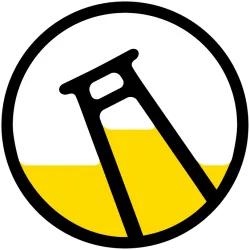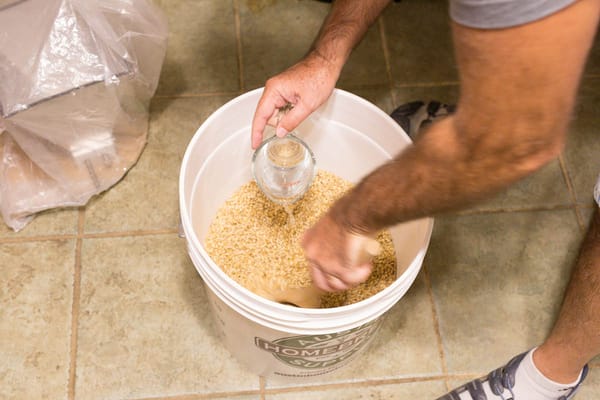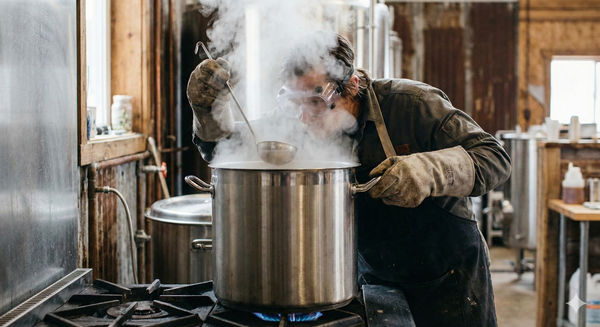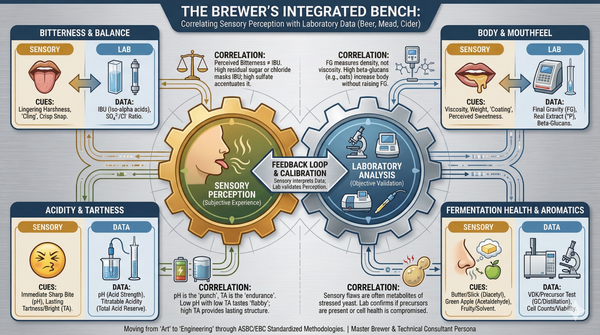PSA - Common Brewery Hazards
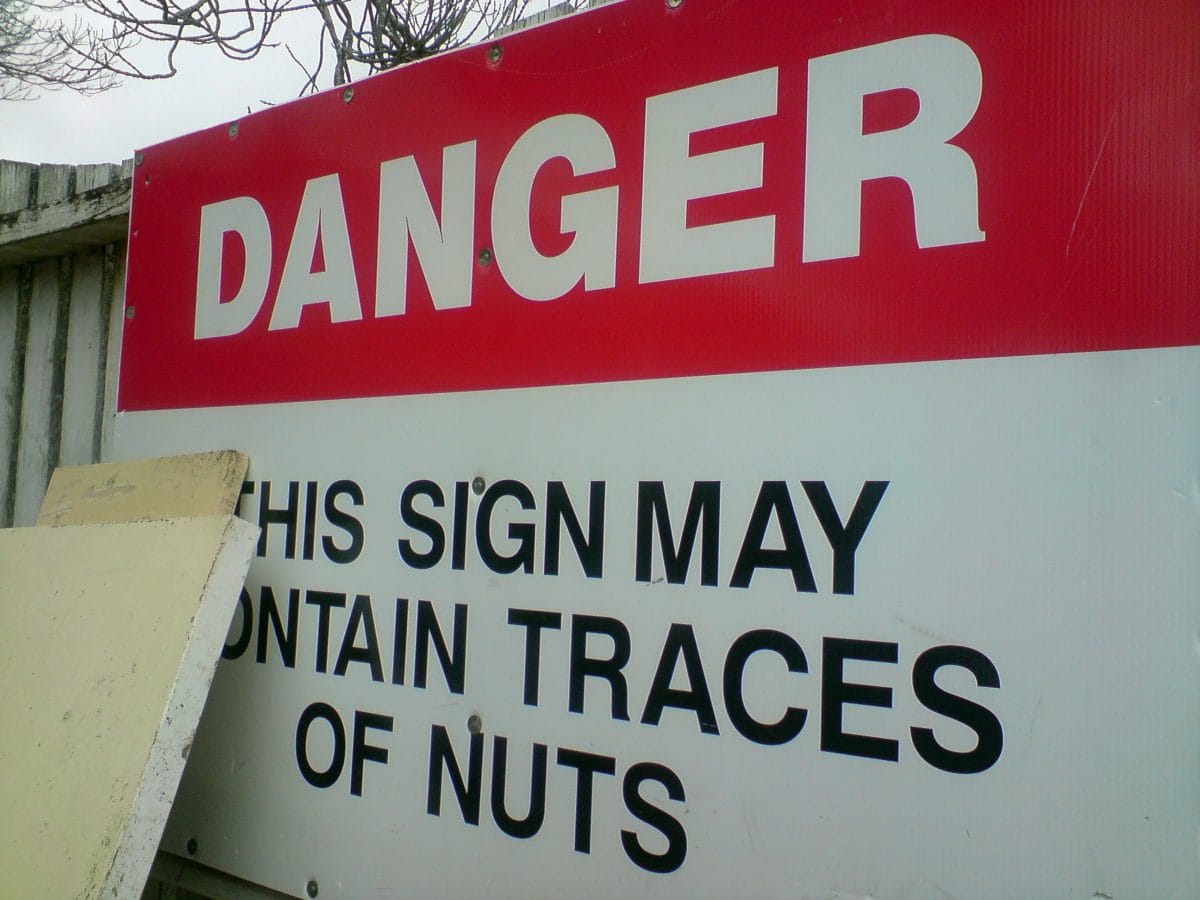
"Danger - this sign might contain traces of nuts " Photo Above by Simon Lieschke. Licensed under Creative Commons.
We often do not recognize the very real and specific dangers in home brewing. I am not trying to scare anyone straight here, but any reasonable person would recognize that what we do has the potential to be dangerous. We handle heavy objects, hot water, use big burners and dangerous levels of pressure all in the pursuit of good beer. Many of us suffer from willful blindness (whether consciously or unconsciously) to the obvious.
Situational awareness was drilled into me as a firefighter years ago. I was trained and behavioral patterns set to observe and react in an immediate and deliberate way to certain circumstances. Fortunately, some of that is still with me. Unfortunately, I occasionally let that slip and do something stupid. A firefighting situation, with hoses and water under tremendous pressure, dangerous flames, gasses and failing structures are more dangerous than a brewery, but we deal with situations on constantly and can be lulled by repetitive and ordinary tasks. We should be engaging all our senses as we brew and expect and be prepared for both major and minor accidents. I can still hear my battalion chief yelling "Don't think, get away!" when he intentionally blew a nozzle off a 50 foot 1 1/2" hose and let it whip around. Not fun to dodge while trying to shut off the hydrant.
I see a tremendous number of forum posts about accidents or really bad ideas that qualify some home brewers for the "Darwin Awards" and I mean well beyond the horrific cuts and stitches from a dropped glass carboy. Perhaps our DIY mentality and dumb stubbornness drives us to act before we think through consequences, but most times it is just impatience or lack of awareness or just plain lack of common sense. The good news is that serious accidents are rare, which perhaps contradicts that last statement, and suggests that on the whole we are a very safety conscious demographic.
I am going to suggest --- which most of you will completely ignore --- that you inventory your brewery and think carefully about the possible hazards. Take the time to make a written plan and share it with those that are around you when you brew. At a minimum, take the issues seriously, at least for a short time, and engage your brain. Consider the possible consequences and make adjustments to your procedures to eliminate or minimize risks. I don't believe I can scare you into behaving more safely, but awareness and deliberate reactions can save a serious burn, a broken limb or a potential fire. With a plan, you can enjoy the brew day without worrying as much.
Below are 6 of the more painfully obvious dangers:
- Acid, Alkali and Caustics: While most of the chemicals we deal with are safe when used properly, it is easy to miscalculate or have an accident. In high concentrations, most of our common chemicals are hazardous. Read the labels and understand the dangers.
- Keep all acids, alkali and brewery chemicals in a safe, dry place, preferably secured from children and pets. Safe storage will also ensure that they are in good condition when you use them, and where you expect. This is a good idea for every household chemical that might be laying around.
- Wear gloves and eye protection when handling these chemicals. Even a little splash of Star-San in the eye can cause a lot of pain and fumbling blindly can increase the danger. It is also a good idea to wear a mask when handling alkali like pickling lime. Inhaling some of these products can cause severe respiratory problems.
- Keep cold clean water handy for rinsing, and some baking soda around when handling acids. Rinse thoroughly to remove the chemical and baking soda can help to safely neutralize any residual acid.
- Have a plan and think through how you handle, store and use these chemicals. When you introduce a new product, make sure to thoroughly read through the instructions and understand any conditions (like mixing acid with water... or avoiding use on aluminum).
- Protect floors and surfaces that you are working on. Use a towel or tray on a slick surface if needed. Keep paper towels handy to clean up spills.
- Wet Floors: Statistically wet floors cause more OSHA work-related accidents than any other scenario.
- Clean up spills immediately. Brewing is a wet business and accidental spills, leaking hose connections and buckets full of sanitizing solution will get on the floor and create slippery footing. Make sure your space can adequately deal with the wet environment, has a non-slip surface and have a mop or squeegee to move standing water away from where you are working.
- Use smaller volumes of water if you cannot handle a full bucket. Full buckets slosh and spill. Half full buckets are lighter, easier to manage and control, and spill less.
- Wear appropriate shoes with good gripping surfaces. While steel or reinforced toes aren't required, they can help when dealing with heavy weights or hot liquids that fall onto your feet. Drop a keg on a toe - and you will immediately buy better shoes!
- Move deliberately and carefully. Sudden movements can cause you to slip. No running in the brewery!
- Use zip ties or other systems to get your electrical cables off the floor and away from the liquid. Of course, tie them safely away from heat sources as well.
- Manage your hoses and keep them out of the workspace where possible. Mention them to your assistants so they know where they can step safely.
- Use GFI electrical outlets or switches whenever you are in a wet area... especially the brewery. These can prevent a very serious electrocution.
- If you brew on an electrical system - please make sure to follow the directions and/or have it installed professionally. Water+Metal+Electricity is dangerous.
- Heavy Lifting: Everything we lift is heavy, from bags of grain to buckets of water. Lift with the legs and not the back is great advice, but also make sure to lift only what you can reasonably control and manage.This is supposed to be fun and not back breaking work. If you are hurt, you should stop and seek treatment. Continuing to brew can create a potentially larger danger.
- Kettles and Tuns are heavy, especially stainless steel. A converted (legal) keggle can weigh 38 pounds without any liquid in it. Make sure the stand or burner is completely stable and able to support the weight of a full kettle.
- Bags of Grain are cumbersome and difficult to handle and easy to spill. Move these carefully into a position where you can handle them properly. Move the grain into smaller bins where you can easily pour or scoop. Don't swing these around using your back, the momentum can be dangerous.
- Stands or burners should be stable, sturdy and level. If it is rickety or the welds look like they are rusting, take the time to repair before you brew. Keeping them level should help prevent the occasional spill. Secure any wheels or rollers carefully.
- Full kegs are heavy. Corny's can weigh over 40 pounds when full and sanke's as much as 140 pounds. Be careful moving and lifting these into place. If you cannot easily lift yourself, make sure to have help or some safe mechanical system to assist. I use furniture dollies for my sanke kegs.
- Make sure there is enough space to move safely and that the footing is adequate. Keep room to turn and lift with the knees.
- Hot Stuff: We are surrounded with hot water, hot wort, hot burners and stands.
- As mentioned, when the burner is on, everyone should be warned about the heat. Keep folks away from boiling wort and hot to touch surfaces. And store metal tools, such as spoons and mash paddles in a bucket of cool water or sanitizer. Don't leave them near a burner or a hot tun.
- Use elbow length gloves when stirring or transferring hot liquids to reduce burns or scalding. This protects from steam as well. I know they suck. Wear them anyway.
- Keep a good clear distance around any lit burner, boiling wort or cooling vessels. Just the radiating heat from a 60,000 BTU burner can catch something on fire.
- Wear cotton or other natural fibers when brewing. Nylon and some poly-blend fabrics will burn rapidly and stick to skin. Just not worth it. Skip the track pants.
- Use a long match or stick lighter when firing up the burner. Position yourself well away, and turn your head away when lighting. Sometimes propane or NG will flash over.
- Be extremely careful with kettle additions. Hops, sugars and kettle finings can cause a boil over. Have a hand ready to shut off the gas when this happens and let it subside. Better yet, be prepared with a spray bottle to knock down the foaming or use a defoaming agent (FermCap -S) to help minimize this risk.
- Keep children, pets and slightly inebriated brewing assistants away when possible.
- Keep an appropriate fire extinguisher handy at all time when using burners, lighters or even electrical systems. (many thanks to /u/chino_brews/ on Reddit for my oversite!)
- Mills, Motors and Drills: Many of us have bought malt mills to eliminate crush variables for our systems. These are industrial tools, and even more dangerous when powered with a motor or drill.
- Wear tight-fitting clothes when operating a mill. Don't let anything get caught in the mill, rollers or shafts while it is spinning.
- Install guards for any wheels or gears that maybe exposed. Especially belt driven reduction wheels. It is very easy to catch a finger or clothing in the belt.
- Drills are safer, but be aware that a hard bit of malt or a stone can seize the mill and the torque can easily hurt your hand or wrist and possibly break free of your grasp and spin uncontrollably. This is particularly dangerous when you have a strong 1/2" drill designed for high-torque application. If you can secure it to a board safely - do so.
- Wear a mask while milling, or mill outside and position yourself upwind of the chaff and dust. Breathing malt dust can cause serious respiratory injury and infection.
- Pressure and Gas: While we understand the issues of flammability (usually) we often forget these vessels are under great pressure. A rupture can cause catastrophic failure, meaning rapid depressurization, explosion, burns (cold and hot) as well as create a very toxic environment.
- Maintain your tanks and valves. If you see anything suspect, replace it immediately. Damaged regulators as well.
- Do not transport any pressure vessel inside a vehicle, including propane, CO2 or O2. If you must,secure it very well in a trunk in a manner to prevent movement.
- Do not transport any such vessel in a hot car. Heat will increase the pressure and possibly cause rupture.
- Do not transport pressure vessels with pets, children or passengers... especially if it is hot!
- Buy and install regulator cages. These are designed to prevent damage when we inevitably knock a tank over. If that happens - inspect the tank, valves and regulators for any damage. If damaged, replace it right away.
- Objects under pressure can shoot things at you, like the lid to a fermenter or a Tri-clamp hose adapter, with extreme velocity. And it takes very little pressure to be deadly. Treat gently and release the pressure slowly before releasing a clamp.
- Be aware of the gas you are using
- Do not use O2 near any burner or electrical switch.
- Remove propane regulators when not in use and ensure your tank is fully shut off
- Do not let CO2 depressurize rapidly. The force of the blast and sudden cooling can cause frost burns and rapid depressurization can cause hearing damage. CO2 pools so ventilate immediately if you have a leak.
- Do not store pressurized tanks in full sunlight or a hot area in the garage.
- Always provide adequate ventilation when using any gas, preferably outside or in a garage with a fully open door or cross breeze.
- Utilize and install a carbon monoxide alarm when brewing in any enclosed space.
This all may seem silly and obvious. Common sense stuff. But there is a lot there to think about.
We brew. We tend to drink a few homebrews during a brew session, but need to make sure we keep our senses. Please do not brew while under the influence. Alcohol dramatically slows our senses and thus our ability to react quickly and responsibly to dangerous situations. Keep your wits about you and use all of your senses. A strange sound or smell can indicate that something has gone wrong.
Keep calm and use common sense. While the dangers above may seem overblown, we should always overestimate and expect a problem. Having a plan will help us quickly deal with an emergency, and can help us keep our brew dogs and cats, kids and grandkids, spouses and brewing assistants safe.
